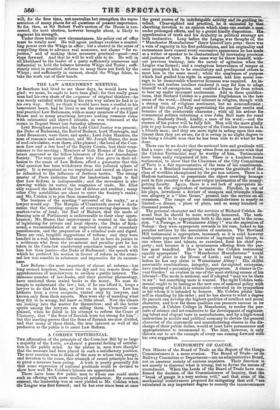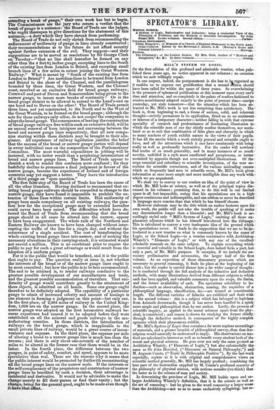UNIFORMITY OF GAUGE.
Thu Minute of the Board of Trade on the Report of the Gauge Commissioners is a mere evasion. The Board of Trade—or its- Railway Committee or Department—are an administrative Board, not an amateur society of curious inquirers. Their function is not merely to discover what is wrong, but to devise the means of amendment. When the Lords of the Board of Trade have con- firmed the decision of the Commissioners of Inquiry, that the "break of gauge is a very serious evil," and that none of the mechanical contrivances proposed for mitigating that evil "are calculated in any important degree to remedy the inconveniences atttending a break of gauge," their own work has but to begin. The Commissioners are the jury who return a verdict that the break of gauge is a nuisance : the Board of Trade are the judges, who ought thereupon to give directions for the abatement of this nuisance,—a duty which they have shrunk from performing. The Board of Trade do not only shrink from recommending the enforcement of uniformity of gauge in lines already constructed ; their recommendations as to the future do not afford security against further extension of the evil. They suggest—and their suggestions are to be moved as resolutions by Sir George Clerk on Thesday—" that no line shall hereafter be formed on any other than the 4 feet 8i inches gauge, excepting lines to the South of the existing line from London to Bristol, and excepting small branch lines of a few miles in extent .joining. the Great Western Railway." What is meant by "South of the existing line from London to Bristol" ? Are meridian-lines to be traced from London and Bristol to the shore of the Channel, and the parallelogram bounded by those lines, the Great Western, and the Channel coast, reserved as an exclusive field for broad gauge railways ; Cornwall and part of Devon and Somersetahire being given to the narrow gauge to insure more breaks of continuity ? Or is the broad guage gauge, to be allowed to extend to the Land's-end on one band and to Dover on the other? The Board of Trade permit three lines not yet constructed, to the North and to the West of the Great lines, to be formed on the broad gauge ; although the acts for these railways only allow, do not compel the companies to adopt the broad gauge. The consequence of leaving the construction of broad gauge railways free within such an extensive field, will be an annual renewal of keen intrigues and canvassing between the broad and narrow gauge lines respectively, that all new compa- nies starting within these districts may be brought to their alle- giance. All experience of railway legislation justifies the belief that the success of the broad or narrow gauge parties will depend in every individual case on the composition of the Parliamentary Committee. The most wasteful expenditure in jobbing will be incurred, with no better result than a perplexing intermixture of broad and narrow gauge lines. The Board of Trade appear to cherish a wish to render this confusion more confused ; for they bashfully decline to pronounce a final judgment in favour of the narrow gauge, because the experience of Ireland and of foreign countries may yet suggest a better. They leave the introduction of a third gauge an "open question." The first false step of the Board of Trade has been the cause of all the other blunders. Having declined to recommend that ex- isting broad gauge railways should be compelled to change to the narrow gauge, they have found it impossible to prohibit the ex- tension of these lines within certain limits. Had uniformity of gauge been made compulsory on all existing railways' the ques- tion how far the exceptional. gauge may be extended hereafter could never have been raised. The difficulties which have de- terred the Board of Trade from recommending that the broad gauge should in all cases be altered into the narrow, appear to have been exaggerated. The whole rails of the Northern and Eastern Railway are known to have been changed without inter- rupting the traffic of the line for a single day' and without the occurrence of a single accident. The cost of transforming the whole existing broad gauge lines into narrow, and of making the necessary alterations in their carrying-stock, it is estimated would not exceed a million. This is no exorbitant price to require the public to pay for such a great advantage as would result from the adoption of a uniform gauge. For it is the public that would be benefited, and it is the public that ought to pay.. The question really at issue is, not whether the interests of the broad or of the narrow gauge lines ought to be most consulted ;but how the public is to be best accommodated. The end to be attained is, to render railways conducive to the greatest possible development of our manufactures and trade, and the greatest possible accommodation of travellers. That uni- formity of gauge would contribute greatly to the attainment of these objects, is admitted on all hands. Some one gauge ought therefore to be definitely adopted. The capability of a 'Articular gauge to admit of increased celerity and amount of haulage is one element in forming a judgment on this point--but only one. In the first place, of 2,264 miles of railway in the United King dom, 1,628 are on the narrow gauge. In the second place, the narrow gauge was adopted on the first locomotive railways be- cause experience had caused it to be adopted before they were established on all the mineral and goods railways in the ma- nufacturing counties. In those districts, the introduction of railways on the broad gauge, which is inapplicable to the small private lines of railway, would be a great source of incon- venience and expense. In the third place, the expense per mile of altering a broad to a narrow gauge line is much less than the reverse ; and there is only about one-seventh of the number of miles to be altered in the former case that there would be in the latter. In the fourth place, the difference between the two gauges, in point of safety, comfort, and speed, appears to be more speculative than real. These are the reasons why it seems that the public interest would be promoted by forthwith reconstructing all the broad gauge lines on the narrow scale. If the interests or the self-complacency of the proprietors and constructors of narrow gauge lines be benefited by such a decision, their advantage is incidental and derivative. It would not be advisable to make the change merely to fill their purses or feed their vanity; but the change, being for the general good, ought to be made even though it have that effect.



























 Previous page
Previous page